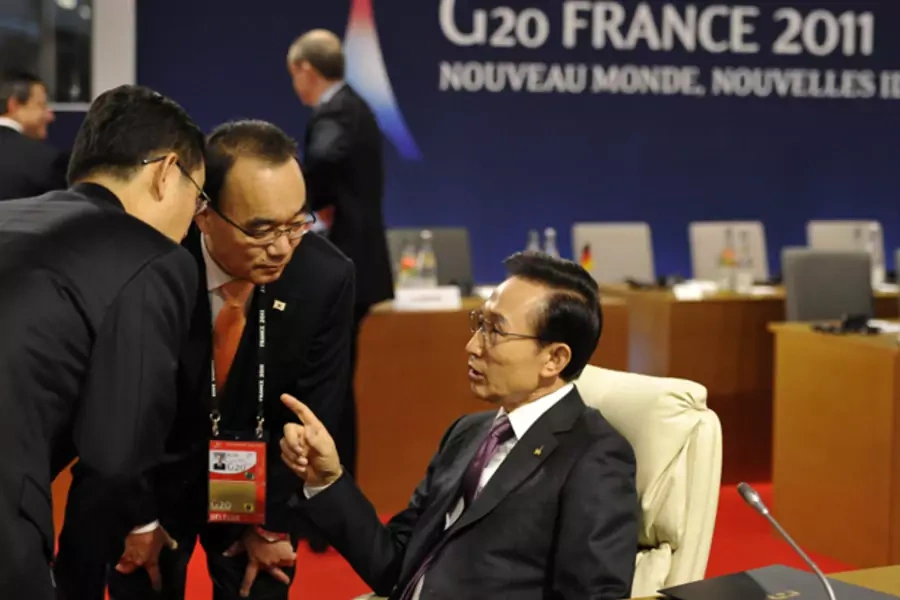Korea Goes Global: And We Mean Security (Not Gangnam Style)

More on:
When one thinks of the world’s emerging powers, the mind is naturally drawn to large, sprawling developing countries like China, India, or Brazil. But there’s another dynamo we often overlook that’s increasingly making its global mark—South Korea. Despite the global downturn of the past several years, the ROK’s economy has grown at an impressive clip, becoming the world’s thirteenth largest in nominal terms. South Korea is also flexing its diplomatic muscles within the Group of Twenty (G20) and other forums, seeking to bridge entrenched divides between the global North and South, East and West. Its most impressive role, however, may be its increasing role in promoting international peace and security well beyond the Korean Peninsula.
These contributions are outlined in a new ebook from the Council on Foreign Relations, edited by Scott Snyder, Global Korea: South Korea’s Contributions to International Security. The book makes clear that Korea will be an increasingly important partner for the United States in advancing global peace and stability, not only in formal organizations like the United Nations but in informal coalitions of the like-minded and capable.
South Korea’s emerging global role seems counterintuitive, given the persistent nuclear and conventional provocations the ROK faces just across its border from a belligerent North Korean regime, which continues to expand and brandish its arsenals. Despite these distractions, South Korea has succeeded in becoming an exporter of international security and a source of global economic stability. This includes making significant commitments to nuclear security, peacekeeping, postconflict stability operations in Afghanistan, and antipiracy patrols in the Indian Ocean. These are just a few of the items sure to be on the agenda this week when Secretary of Defense Leon Panetta meets Wednesday with his ROK counterpart at high-level defense talks in Washington.
South Korea has demonstrated itself to be one of the few non-European countries with the capacity and the will to assume new international security roles. It now ranks twelfth globally in terms of national defense expenditures, above even well-established middle powers like Canada and Australia. Consistent with these growing capabilities, the 2010 South Korean Defense White Paper now includes “contributing to regional stability and world peace” alongside national defense and preparing for Korean reunification in the nation’s top three priorities. To discharge these new overseas obligations, Seoul has established a three-thousand strong standing expeditionary unit and a center for peacekeeping operations dedicated to training military personnel for overseas assignments. These are historic shifts for the ROK, which has for decades been primarily an importer of global security, relying (as it continues to) on the security guarantee provided by the U.S. military, including a significant U.S. troop presence in-country. Country experts Scott Bruce, John Hemmings, Balbina Hwang, Terence Roehrig, and Scott A. Snyder predict that South Korea’s contributions to global security will persist, and even grow, notwithstanding future budgetary and demographic constraints.
As the authors document, South Korea’s contributions to global security are impressive. Since an early foray into Somalia in 1993, South Korea has expanded its involvement in UN peace operations and currently contributes troops to ongoing operations in Haiti and Lebanon. It sustains a continuous naval presence in the Gulf of Aden and Indian Ocean as part of multinational anti-piracy efforts, thanks to the construction of six modern destroyers over the past decade. In Afghanistan, the country has maintained a provincial reconstruction team in the province of Parwan, helping not only to stabilize that country but gaining experience that could be invaluable in the event of Korean reunification. Finally, since North Korea’s second nuclear test in June 2009, South Korea has become an active participant in the U.S.-led Proliferation Security Initiative, a multilateral arrangement intended to interdict illicit shipments of weapons of mass destruction and related technology by sea, air, and land. Securing ROK cooperation in this initiative has been a major boon to counterproliferation efforts, given North Korea’s well-established role in the world’s clandestine nuclear arms trade.
In November 2010, South Korea became the first non-G8 member to host a G20 summit. Seoul set a very high bar, not only for substantive summit outcomes but also for its assiduous outreach efforts to integrate the perspectives of non-G20 members (the so-called “G173”), international organizations like the IMF and United Nations, and representatives for business, labor, and civil society. The ROK government also expanded the G20 summit agenda to encompass the challenge of global development, so often stuck in a stale conversation between aid “donors” and “recipients.” The following year, South Korea hosted the Busan Summit on Aid Effectiveness. This helped move the conversation beyond received orthodoxies, by showing how developing countries could learn from each other’s national experiences. Given its own miraculous rise from the ashes of World War II, South Korea itself had the credibility to broaden the discussion.
More recently, in March 2012, Seoul hosted the second Nuclear Security Summit, building on President Obama’s inaugural meeting in Washington two years earlier. This event brought fifty-three nations and four international organizations together to address one of the most pressing, and potentially existential challenges facing humankind: how to secure the tons of still unsecured fissile material around the world. After the summit concluded, the Bulletin of the Atomic Scientists estimated that 90 percent of the commitments from the 2010 summit had been completed.
Given Korea’s security concerns in its immediate vicinity, its determination to contribute to global public goods is remarkable and points to a continuing rise in influence globally.
More on:
 Online Store
Online Store